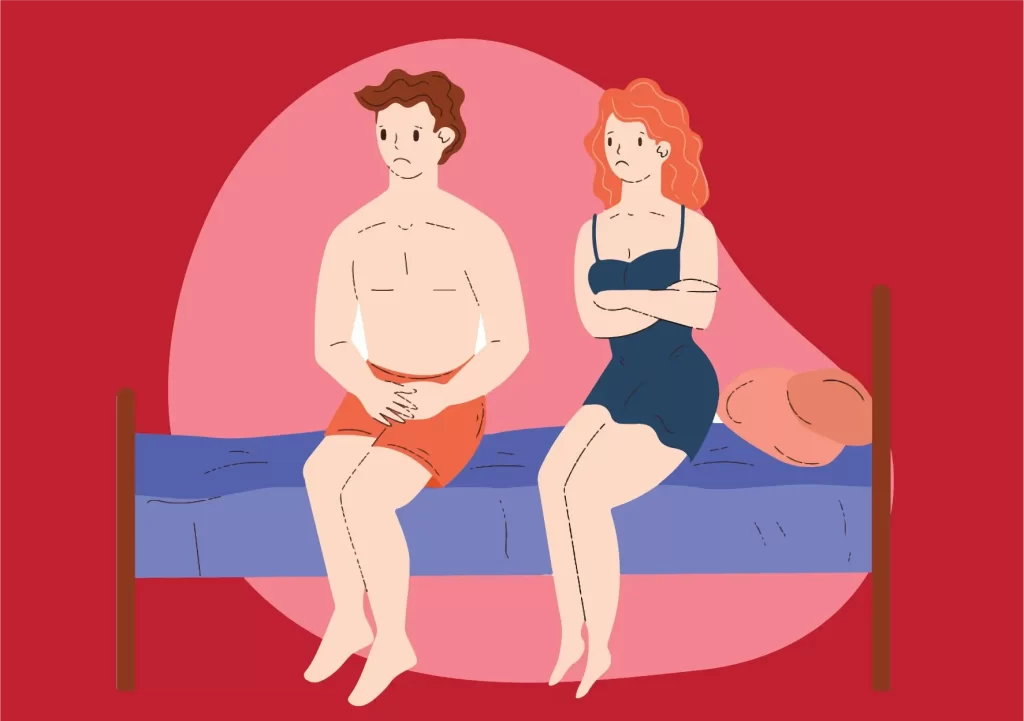Table of Contents
ToggleIntroduction:
Exploring the Contributing Causes of Erectile Dysfunction: Get an awareness of the root Cause of Erectile Dysfunction, as well as the influence that these factors have on a person’s level of self-confidence, the quality of their relationships, and their overall health. In spite of the prevalence of this male health issue, it is important to investigate the various potential solutions that are available to live a fulfilling life.Here, we mainly discuss erectile dysfunction causes and treatments.
This site promises a thorough education on the subject and unwavering support for Overcoming ED.
What is Erectile Dysfunction?
Erectile dysfunction (ED) is a condition in which a male has difficulty achieving or maintaining an erection that is satisfactory for sexual activity. A man with this condition cannot maintain his penis erect during sexual activity. This type of male experiences frustration, insecurity, relationship strain, and emotional distress.
Common Physical Causes of Erectile Dysfunction
Causes of Erectile dysfunction are diverse and it is important to recognize them before treatment.
-Age and Hormonal Imbalances:
Age Can Cause Erectile dysfunction:
Uncovering the Causes of Erectile Dysfunction:- Age is a factor that can contribute to erectile dysfunction (ED). As males age, their bodies undergo changes that can affect their sexual behavior. Some physical and biological changes commonly occur with aging, including decreased blood supply to the penis and decreased production of hormones such as testosterone.
Hormonal Imbalance as a Cause of Erectile Dysfunction:
Imbalances in hormones can also cause of erectile dysfunction. Hormones are very important for controlling many bodily processes, like sexual function. If the balance of hormones is off in any way, it can affect sexual desire and effectiveness.
Identifying What Causes of Erectile dysfunction (ED) is largely caused by aging-related causes. Some of the causes of erectile dysfunction in older men can be attributed to physiological changes, such as less blood supply to the penis and decreased hormone production, including testosterone. Determine the origins of this widespread problem in order to effectively address it.
Erectile Dysfunction cause by medicines that change hormone levels, like some drugs or blood pressure medicines. These medicines could upset the balance of hormones that are needed for good sexual function.
-Cardiovascular Issues
Heart problems can block blood flow, making it hard to get an erection or keep it going. Plaque buildup in the arteries can make blood vessels narrow and tighten, lowering the amount of blood that gets to the penis.
Heart problems can throw off the careful balance of blood flow that is needed for an erection to work. Heart disease or a history of heart attacks can be signs of an underlying circulatory disease that makes men more likely to get ED. Also, some medicines used to treat heart problems, like beta-blockers or diuretics, can have side effects that make it hard to get or stay sexually active.
People with heart problems need to be aware of the possible link to ED and talk to their doctor about it. It is possible to improve both heart health and erectile performance by taking care of and treating heart problems, such as by making changes to your lifestyle, taking medicine, or having angioplasty or bypass surgery.
-Diabetes
Diabetes can be a significant contributor to erectile dysfunction in males. Diabetes makes it difficult for individuals to regulate their blood sugar, which, over time, can damage blood vessels and nerves. Blood vessel and nerve damage can make it difficult for blood to circulate normally and provide the sensation required for a strong erection.
Managing diabetes with the right amount of blood sugar control, a healthy lifestyle, and medicine can help lower the chance of ED or make its symptoms go away. Seeking medical advice and talking about your worries with a doctor or nurse can help you manage both diabetes and ED more successfully. [ Read more: Can Diabetes Lead to Erectile Dysfunction? ]
-Neurological Conditions
Neurological diseases can affect the penis’s capacity to communicate with the brain and spinal cord, which can interfere with erection induction and maintenance. Reduced sensitivity in the genital region, poor coordination of the muscles involved in erection, or trouble delivering signals required for blood flow to the penis are all symptoms of nerve injury.
Psychological Factors Contributing to Erectile Dysfunction
Stress and Anxiety:
Stress, such as that from work or relationship issues, can make it difficult to be sexually active. Anxiety about sexual behavior or other circumstances can lead to erectile dysfunction.
Depression:
Depression can affect sexual drive and mess up the chemistry of the brain, making it hard for the brain to send the signals needed to get an erection.
Performance Anxiety:
ED episodes in the past can lead to a circle of Performance Anxiety, where the fear of failing and more ED episodes worsen the problem.
Problems in relationships:
Problems in a relationship, like bad communication, unresolved conflicts, or mental distance, can make it hard to be intimate sexually and lead to ED.
Options for Erectile Dysfunction Treatment
-Lifestyle Changes:
Changing some things about your lifestyle can help Treat Erectile Dysfunction (ED) and improve your sexual function. Here are some important changes to your life that can help:
A healthy diet is one that is full of fruits, veggies, whole grains, lean proteins, and healthy fats. This is important for erectile function because it helps the heart stay healthy.
Regular exercise:
Regular physical activity, like aerobics, can help improve blood flow, improve heart health, and help men keep their erections.
Managing your weight:
Keeping a healthy weight or losing extra weight can help with ED since obesity is often linked to a higher chance of ED.
Quit smoking:
Smoking can damage blood vessels and slow blood flow, which can make it hard to get and keep an erection.
Learn more: Smoking and Male Impotence: A Direct Result
Limiting alcohol use:
Too much alcohol can make it hard to be sexually active. ED can be better controlled by drinking less or not drinking too much.
ED can be caused or made worse by high amounts of stress. ED signs can be eased by doing things to reduce stress, like working out, learning how to relax, or doing things you enjoy.
Open communication:
Talking about ED worries with a partner in an open and honest way and asking for their support can make you feel less anxious and improve your overall sexual experience.
Even though making changes to your lifestyle can help, it’s important to remember that ED can also be caused by physical conditions or mental issues. It is best to talk to a healthcare worker to find out what’s going on and how to treat it best.
–Erectile Dysfunction Medication and Supplements
For men with erectile dysfunction (ED), there are Medicines and Supplements that can help.
Oral medications:
Sildenafil (Viagra), tadalafil (Cialis), vardenafil (Levitra), and avanafil (Stendra) are common oral medications that help improve blood flow to the penis and make it easier to get an erection.
You can also Buy Cenforce 200mg, a popular medication for treating ED.
Learn more: Do Chewable ED Medications Really Work?
Alprostadil:
There are different kinds of alprostadil. It can be given as an injection (Caverject, Edex) or as a pill that is put into the urethra (MUSE).
Herbal supplements:
Ginseng, L-arginine, and horny goat weed are all examples of herbal supplements that are promoted as possible natural Treatments for ED. But it’s important to be careful and talk to a doctor before taking any of these supplements because their safety and usefulness can vary.
-Therapy and Counseling
When it comes to treating erectile dysfunction (ED), therapy and counseling can be helpful, especially when psychological issues are at play. Here is a quick run-down:
Cognitive-Behavioral Therapy (CBT):
CBT is a type of therapy that is often used to treat mental problems that can lead to ED. It focuses on figuring out what negative thoughts, beliefs, and actions you have about sexual satisfaction and changing them. CBT can help people feel less anxious, have more confidence, and have better sexual health generally.
Couples therapy:
When an eating disorder affects the way a pair interacts and how close they feel to each other, couples therapy may help. It gives partners a safe place to talk, learn more about each other, and come up with ways to deal with how ED affects their relationship.
Sex therapy is a type of counseling that is designed to help with sexual problems and issues, such as ED. It includes working with a trained therapist who can give advice, education, and techniques to improve sexual functioning and satisfaction.
Psychological counseling:
Individual counseling or therapy can help deal with problems like stress, anxiety, depression, or traumas from the past that may be causing or contributing to ED. By dealing with these worries, people can gain insight, learn ways to cope, and improve their general mental health, which can have a positive effect on their sexual function.
Conclusion:
ED is a disease that can affect more than just your sexual health. It can also hurt your health and quality of life in general. There are many different and many reasons for erectile dysfunction. ED can often be controlled or treated easily if you get the right help and support. Many men can regain their sexual confidence and have healthy relationships if they get the right help and use an all-around way.

Sam Mathew has significant education and professional experience in the field of psychiatry. He is an expert in managing the psychological elements and issues associated with erections. He has extensive knowledge of mental health and really cares about people’s overall well-being. He has a special way of looking at how psychology and sexual health are connected.
He has spent many years working with people who have challenges with sexual performance . This hands-on experience has helped him understand the emotional and mental parts of this situation really well. He explains his patients and refers them to different treatment choices.
He is a psychiatrist who focuses on mental health and sexual well-being. His commitment to these areas is clear in their work. He tries to overcome the obstacles around this sometimes touchy subject, helping and advising those who want it. He is a reliable and expert writer who shares his experiences in medical journals and on health websites all around the world.
